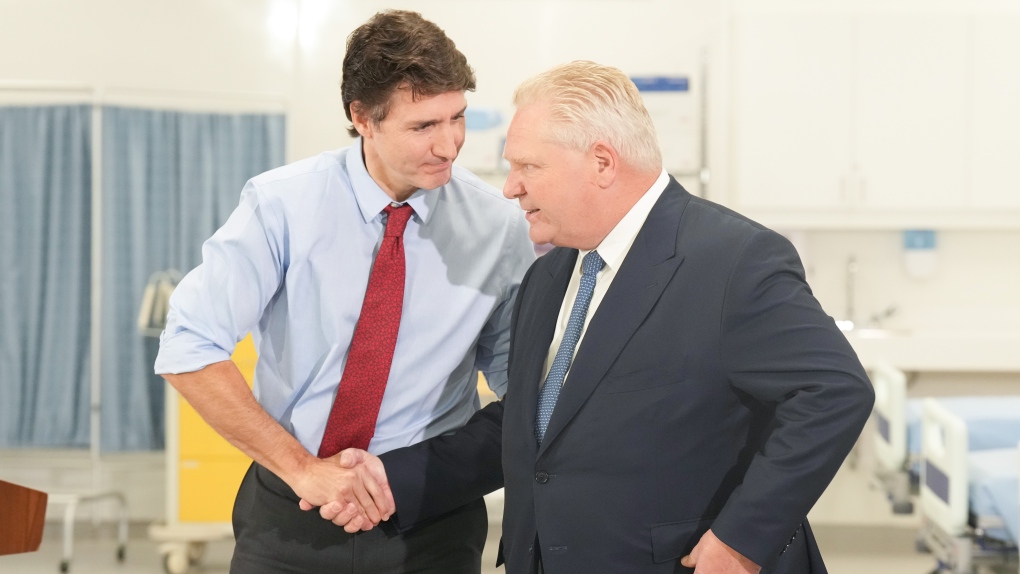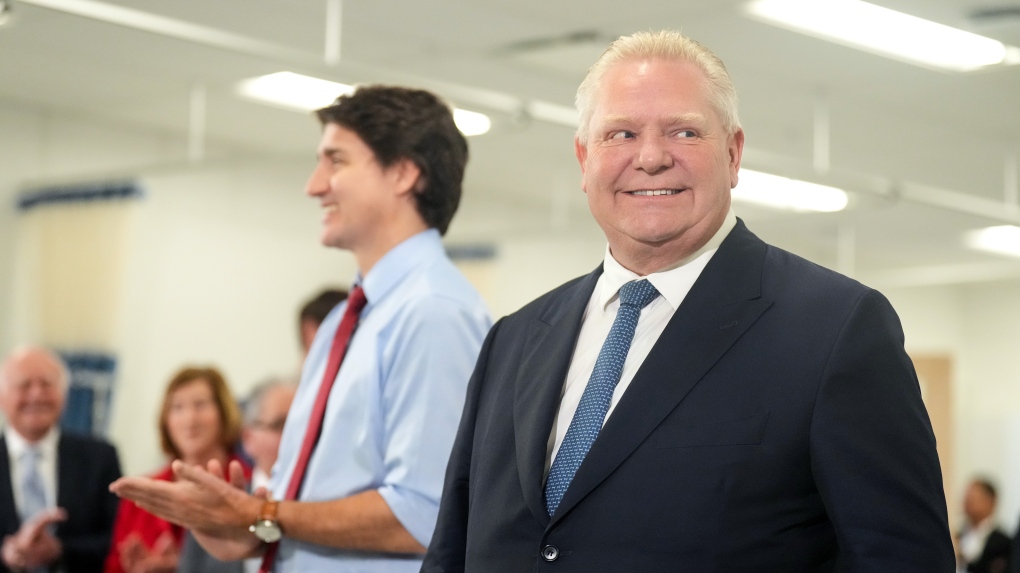Ontario signs $3B health-care deal with feds to increase access to doctors, reduce wait times
Ontario Premier Doug Ford has signed a $3.1-billion health-care deal with the federal government to increase access to primary care and reduce wait times.
The agreement was announced by Prime Minister Justin Trudeau late Friday morning, making Ontario the fifth province to come to an agreement with Ottawa for its share of a $200-billion health accord.
- Download our app to get local alerts on your device
- Get the latest local updates right to your inbox
The other provinces with agreements include British Columbia, Prince Edward Island, Alberta and Nova Scotia.
The announcement comes almost a year after the two governments reached a 10-year deal in principle to pay for health care in Ontario, with an additional $46 billion in funding to the Canada Health Transfer.
Premiers have been asking the federal government to increase their annual health transfers to cover 35 per cent of their health budgets, up from 22 per cent.
This kind of increase would have amounted to about $28 billion a year, with an additional five per cent annually after that.
 Prime Minister Justin Trudeau and Ontario Premier Doug Ford attend an announcement at Seneca College, in King City, Ont., Friday, Feb. 9, 2024. THE CANADIAN PRESS/Chris Young
Prime Minister Justin Trudeau and Ontario Premier Doug Ford attend an announcement at Seneca College, in King City, Ont., Friday, Feb. 9, 2024. THE CANADIAN PRESS/Chris Young
About a year ago, Ottawa said its bilateral deal with Ontario included $8.4 billion and a one-time top-up of $776 million to address “urgent needs” in pediatric hospitals and emergency rooms.
As part of the deal, provinces had to agree to expand access to family health services, support health workers and reduce backlogs, increase mental health and substance use support, and modernize their health-care systems to include digital tools.
The $3.1 billion promised Friday covers the first three years of this agreement, ministry officials confirmed.
“For generations, universally accessible health care has been a core part of what it means to be Canadian,” Trudeau told reporters. “It’s built on a promise that, no matter where you live or what you earn, you will always be able to get the medical care you need.”
Under the agreement, Ontario has pledged to add hundreds of new family physicians and nurse practitioners, as well as thousands of nurses and personal support workers to fill staffing shortages. The funding will also be used to remove barriers for internationally trained doctors, add five new Youth Wellness Hubs, and address gaps in Indigenous health-care services.
 Ontario Premier Doug Ford and Prime Minister Justin Trudeau Ford attend an announcement at Seneca College, in King City, Ont., Friday, Feb. 9, 2024. THE CANADIAN PRESS/Chris Young
Ontario Premier Doug Ford and Prime Minister Justin Trudeau Ford attend an announcement at Seneca College, in King City, Ont., Friday, Feb. 9, 2024. THE CANADIAN PRESS/Chris Young
Ford called the deal “historic,” saying it was about advancing priorities regardless of political stripes and will help fund targeted programs.
“This new funding will bolster the significant work we are doing in Ontario,” he said.
“While we are pleased with our progress, we know there is more work to do. That’s why today’s agreement is so important to strengthening our health-care system.”
More resources needed, medical association says
The Ontario Medical Association said that while the funding announcement is welcome and has the potential to help with urgent issues, it is not enough to address “significant structural challenges” within the health-care system.
“While we tackle the most urgent issues, we also need to ensure we have a long-term, stable funding formula to fix the underlying issues in [the] system and build for [the] future, knowing we have an aging and more medically complex patient population,” OMA President Dr. Andrew Park said in statement.
The OMA has been ringing alarm bells for years, warning that 2.3 million people in Ontario are without a family doctor.
CUPE's Ontario Council of Hospital Unions said last month that a survey showed two in five workers in the province had contemplated leaving their jobs and a similar amount dread going to work due to understaffing.
CTVNews.ca Top Stories

BREAKING Boissonnault out of cabinet to 'focus on clearing the allegations made against him,' Trudeau announces
Prime Minister Justin Trudeau has announced embattled minister Randy Boissonnault is out of cabinet.
Families of Paul Bernardo's victims not allowed to attend parole hearing in person, lawyer says
The families of the victims of Paul Bernardo have been barred from attending the serial killer’s upcoming parole hearing in person, according to the lawyer representing the loved ones of Kristen French and Leslie Mahaffy.
BREAKING Baby pronounced dead following 'suspicious incident' in Toronto's midtown area
A baby has died after a 'suspicious incident' in a midtown Toronto neighbourhood, police say.
'They squandered 10 years of opportunity': Canada Post strike exposes longtime problems, expert says
Canada Post is at ‘death's door’ and won't survive if it doesn't dramatically transform its business, a professor who has studied the Crown corporation is warning as the postal workers' national strike drags on.
Sask. woman who refused to provide breath sample did not break the law, court finds
A Saskatchewan woman who refused to provide a breath sample after being stopped by police in Regina did not break the law – as the officer's request was deemed not lawful given the circumstances.
'Bomb cyclone' batters B.C. coast with hurricane-force winds, downing trees onto roads and vehicles
Massive trees toppled onto roads, power lines and parked cars as hurricane-force winds battered the B.C. coast overnight during an intense “bomb cyclone” weather event.
EV battery manufacturer Northvolt faces major roadblocks
Swedish electric vehicle battery manufacturer Northvolt is fighting for its survival as Canadian taxpayer money and pension fund investments hang in the balance.
Canada closes embassy in Ukraine after U.S. receives information on 'potential significant air attack'
The Embassy of Canada to Ukraine, located in Kyiv, has temporarily suspended in-person services after U.S. officials there warned they'd received information about a 'potential significant air attack,' cautioning citizens to shelter in place if they hear an air alert.
U.S. woman denied parole 30 years after drowning 2 sons by rolling car into South Carolina lake
A parole board decided unanimously Wednesday that Susan Smith should remain in prison 30 years after she killed her sons by rolling her car into a South Carolina lake while they were strapped in their car seats.

































